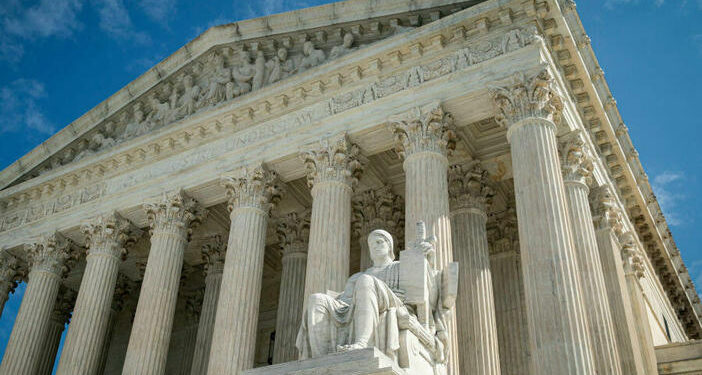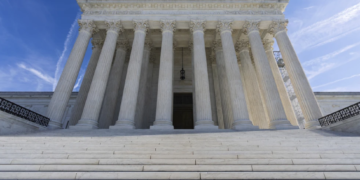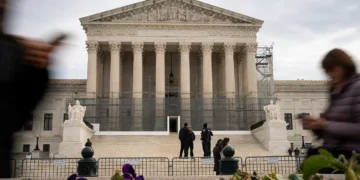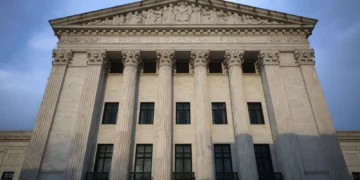July 24, 2025 Story by Publisher
This article has been updated to include the opinion from the United States Court of Appeals for the Eighth Circuit and the application for a stay submitted to Justice Kavanaugh.
The U.S. Supreme Court has issued a temporary stay on a decision from the U.S. Court of Appeals for the 8th Circuit that would have barred private individuals and civil rights organizations from suing under Section 2 of the Voting Rights Act (VRA) in seven Midwest states. These states include North Dakota, South Dakota, Iowa, Nebraska, Missouri, Arkansas, and Minnesota.
The new, unsigned order comes as two tribal nations in North Dakota prepare to ask the high court to take up a full review of the ruling in a redistricting case out of the 8th U.S. Circuit Court of Appeals.
“The application for stay presented to Justice Kavanaugh andby him referred to the Court is granted. The issuance of the mandate of the United States Court of Appeals for the Eighth Circuit, case No. 23-3655, is stayed pending the filing and disposition of the petition for a writ of certiorari, if such writ is timely sought. Should the petition for a writ of certiorari be denied, this stay shall terminate automatically.In the event the petition for a writ of certiorari is granted, the stay shall terminate upon the sending down of the judgment of this Court. Justice Thomas, Justice Alito, and Justice Gorsuch would deny the application.”
The stay comes in response to a recent ruling by the U.S. Court of Appeals for the 8th Circuit, which held that private individuals and civil rights groups no longer have the authority to bring lawsuits under Section 2 of the VRA. The court ruled that only the U.S. Department of Justice could enforce the statute.
Kavanaugh’s order gives hope to the Turtle Mountain Band of Chippewa, Spirit Lake Nation and Native American voters that the Supreme Court could take up the Voting Rights Act lawsuit they brought against the state.
Justice Kavanaugh’s administrative stay halts enforcement of the 8th Circuit decision while the Supreme Court considers whether to hear a formal appeal. His action restores, at least temporarily, the longstanding interpretation that private citizens may sue to challenge racially discriminatory voting laws.
Earlier this month, a federal appeals court decline to revisit a decision that barred private individuals and groups from suing to enforce Section 2 of the Voting Rights Act—a key civil-rights safeguard aimed at preventing racial discrimination in voting.
The ruling impacts seven Midwestern states in the jurisdiction of the 8th U.S. Circuit Court of Appeals (Arkansas, Iowa, Minnesota, Missouri, Nebraska, North Dakota and South Dakota).
The order released on July 3rd, was a similar decision to a Arkansas redistricting case.
On May 14, 2025, a three‑judge panel confirmed a prior 2023 ruling holding that Section 2 of the Voting Rights Act does not unambiguously grant private parties a right to sue, either directly or by leveraging Section 1983 of the Civil Rights Act of 1871.
Section 2 prohibits voting laws, practices, or procedures that discriminate based on race, color or language minority status. Section 1983, meanwhile, allows individuals to sue state officials for otherwise enforceable rights. For decades, plaintiffs used 1983 to litigate discrimination under Section 2. But in 2023, the 8th Circuit held that private plaintiffs have no Section 2 claim at all. The May decision goes further: even the back‑door route via Section 1983 were closed unless the law explicitly gives a private right—something the majority found Section 2 lacks.
“Because the Voting Rights Act’s Section 2 does not unambiguously confer an individual right, the plaintiffs do not have a cause of action under Section 1983 of Title 42 of the U.S. Code to enforce Section 2 of the Act,” wrote Circuit Judge Raymond Gruender, who was nominated by former President George W. Bush and joined in the opinion by Circuit Judge Jonathan Kobes, a nominee of President Trump.
That statute gives individuals the right to sue state and local government officials for violating their civil rights. Section 1983 stems from the Ku Klux Klan Act that Congress passed after the Civil War to protect Black people in the South from white supremacist violence, and voting rights advocates have considered it an antidote to a controversial 2023 decision by a different federal appeals panel that made it harder to enforce Section 2 in the 8th Circuit.
In 2023, a separate Eighth Circuit panel significantly limited Section 2 enforcement by ruling that the Act does not itself confer a private right of action. Plaintiffs thereafter relied on Section 1983 to carry forward most Voting Rights Act cases in the circuit.
The July ruling closed even that avenue, siding with Republican state officials who argued that Section 1983 permits suits only for rights “unambiguously” established by Congress—and that Section 2 does not meet that threshold because it does not explicitly authorize private enforcement.
Arkansas State Conf. NAACP v. Arkansas Bd. of Apportionment
The 8th Circuit ruling stemmed from a redistricting lawsuit filed in December 2021 on behalf of the Arkansas State Conference of the NAACP and the Arkansas Public Policy Panel. The groups alleged that a state House map passed after the release of 2020 census data weakened the impact of Black votes, which violates Section 2 of the VRA.
The ruling overturns a 2023 North Dakota district‑court decision that found the state’s 2021 legislative redistricting diluted Native American voting strength. That lower‑court order reshaped districts to boost representation, resulting in the election of three Native legislators.
But the 8th Circuit reversed. It instructed the district court to dismiss the suit—not on the merits of discrimination, but due to the absence of a private enforcement pathway.
On December 29, 2021, the Arkansas State Conference of the NAACP and an Arkansas non-profit filed a federal lawsuit against the State of Arkansas, the Arkansas Board of Apportionment, and the State’s Governor, Secretary of State, and Attorney General challenging the Board’s state House redistricting plan as diluting Black voters’ voting strength in violation of Section 2 of the Voting Rights Act (“VRA”). They sought a judicial declaration that the plan violated the VRA and an injunction barring the plan, or any other unlawful plan, from being used in future elections.
On February 17, 2022, the district court held that it lacked jurisdiction to hear the plaintiffs’ claims on the grounds that Section 2 of the VRA did not provide a cause of action for private citizens to enforce its requirements. Rather than dismiss the suit, the court gave the U.S. Attorney General 5 days to decide whether to join the case as a plaintiff.
On February 22, 2022, the United States informed the court it would not be joining the case. That same day, the court dismissed the case and on February 23, 2022, the plaintiffs appealed to the U.S. Court of Appeals for the Eighth Circuit.
Oral arguments before the 8th Circuit were held on January 11, 2023. The court issued an opinion on November 20, 2023, affirmed the district court.
On January 30, 2024, the Eighth Circuit Court of Appeals declined to rehear the case en banc.
The case centers on a recent ruling by a divided panel that determined private individuals and civil rights organizations cannot enforce Section 2 of the Voting Rights Act through 42 U.S.C. § 1983.
“Without the ability for individuals and civil rights organizations to enforce Section 2 of the Voting Rights Act, the law becomes meaningless in the Eighth Circuit,” Janette McCarthy-Wallace NAACP General Counsel shared in a statement. “Those who seek to dilute our voting power will do so unchecked, and that should alarm every judge on this Court. The idea that the Department of Justice alone can, or currently would, bear the burden of protecting our fundamental rights defies reality and recent history. The NAACP is proud to stand with its Arkansas State Conference and others demanding full, en banc review of this dangerous decision — because silencing Black, Brown, and Indigenous voices is not just unjust, it’s unconstitutional.”
The filed amicus brief highlights the devastating impact this ruling would have on communities of color and underscores the urgent need for the full Eighth Circuit to revisit and reverse the panel’s decision.
The DOJ has made clear that limited federal resources prevent it from fully enforcing the Voting Rights Act on its own,” Barry Jefferson, President, NAACP Arkansas State Conference said in a statement. “That’s why the ability to pursue private litigation has always been essential. Stripping away that power leaves the people of Arkansas and the entire Eighth Circuit defenseless against voter suppression which cannot stand.”
Source: ACLU Arkansas / ACLU Kansas Democracy Docket / NAACP / NPR / The American Redistricting Project
















